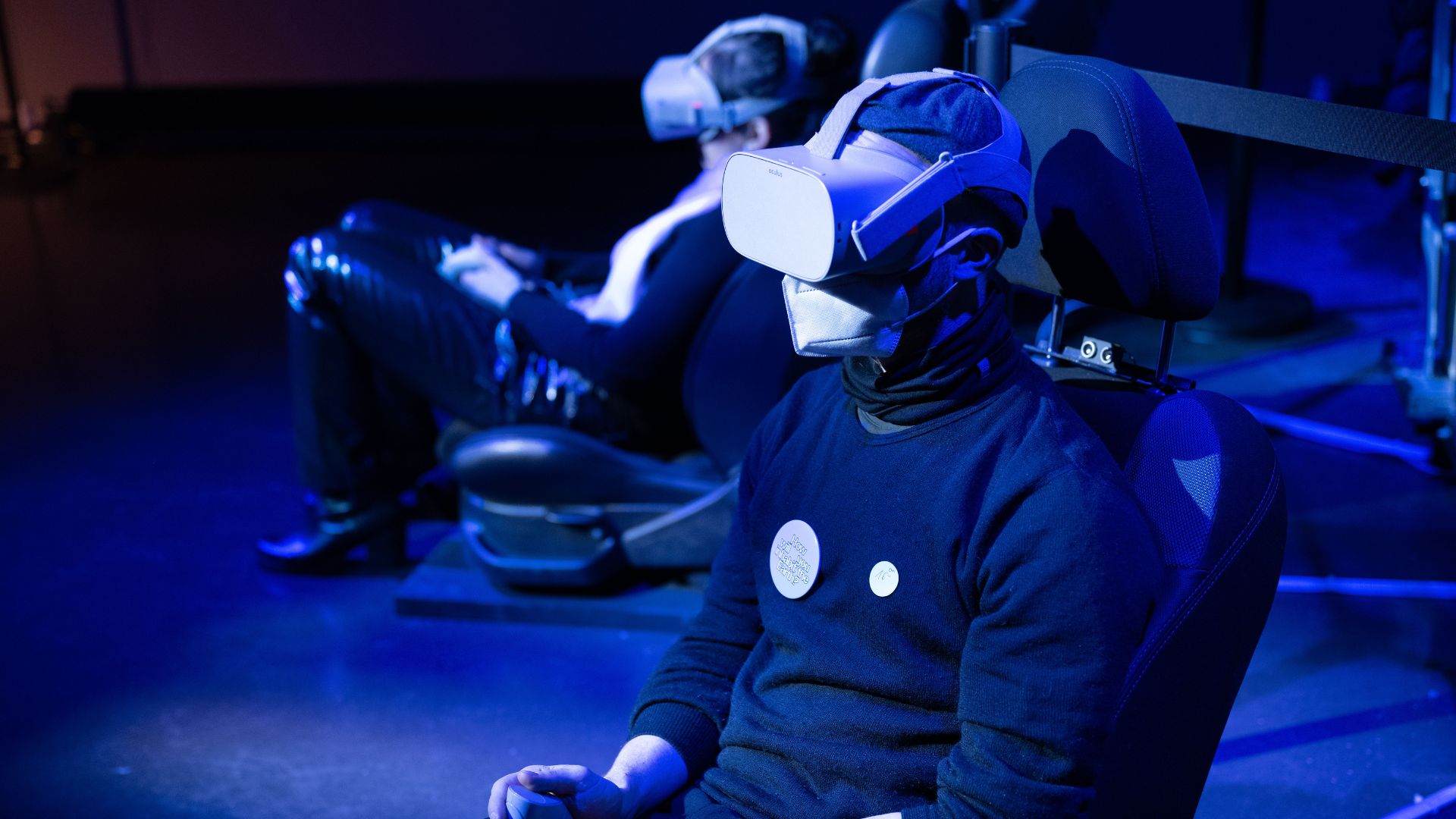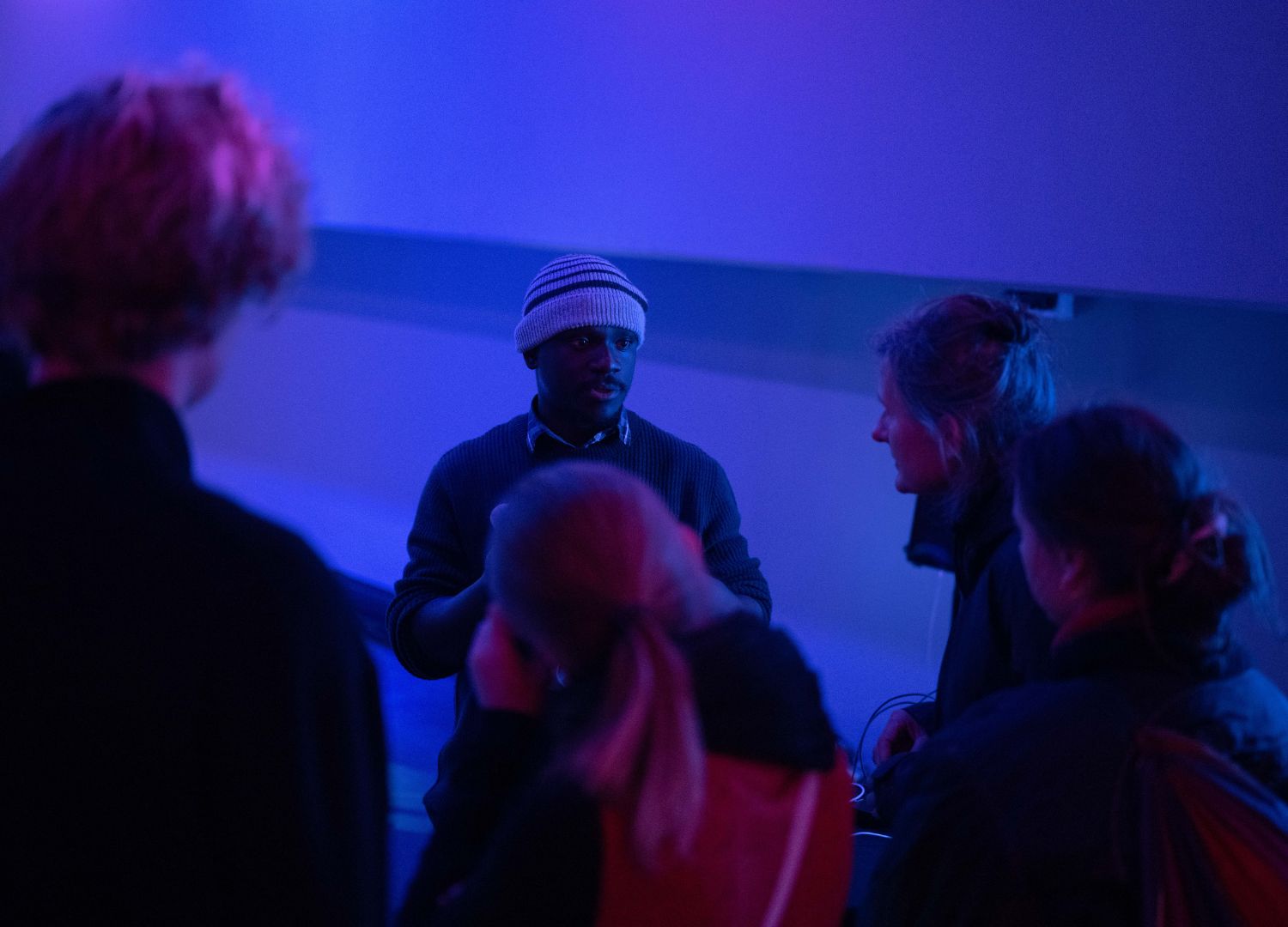TRONS ‘R’ Us reflects on the idea of consumer electronics as ‘prostheses’
“Anti-Machines with possibilities of becoming para-machines, meta-machines, and trans-machines” – interview with Ghanian artist Akwasi Bediako Afrane

Questioning and analyzing human consumer nature, Ghanaian artist Akwasi Bediako Afrane takes a unique approach to contribute to discussions surrounding the relationship between humans, technology, and the environment.
The artist project titled TRONS ‘R’ Us reflects on the idea of consumer electronics as ‘prostheses’ for humans and how they have become a must-have to feed us with information, to store images, videos or text, and how these ‘prostheses’ are meant to be cast-off and upgraded after short periods of time, hence allowing manufacturers to “effectively control society”.
Having a distinctive approach to the prosthetic human-machine relationship, Akwasi project is part of the scientific and artistic collaboration “Driving the Human” (2020-2023). In this exclusive interview with DesignWanted, Akwasi shares the thought process behind TRONS ‘R’ Us, and an in-depth introduction to the elements that compose the project: the TRONS, the installation, the documentary, and the workshops.

Who is Akwasi Bediako Afrane? How did the journey for becoming part of the 3-year-long project Driving the Human begin?
Akwasi Bediako Afrane:
“I am a Ghanaian artist living and working in Kumasi Ghana. My fascination with technology, and its relevance and relation to humans and the environment led me on the path of the TRONS in 2015. After hearing about the open call for the 3 years long Driving the Human project in 2021, I submitted a proposal. The proposal was accepted, and that was when the beautiful journey with Driving the Human began for me.”

Why TRONS ‘R’ Us, why focusing on investigating and exploring the relationship between humans, technology and our environment?
Akwasi Bediako Afrane:
“At the apex of the human civilization hierarchy is technology, and what better represents technology as a whole today if not consumer electronic devices? As a consumer of these devices myself, I find it very thought-provoking how easy it is to be overwhelmed with the constant production and updates of these devices, that one can easily lose track of the numerous devices available.
As patrons, we amass and abandon more of these gizmos in our quest to supplement our deficiencies. In the process, a black-box is constantly left unexplored, as unbeknownst to us we are constantly discarding gizmos that hold on to shared histories and consciousness.
My practice primarily stems from my fascination, if not obsession with technology, and through the creation of TRONS, I aim to provoke discussions about discourses surrounding the relationship between humans, technology and our environment.

TRONS ‘R’ US, present these TRONS as a white-box to incite conversations about our consumer nature, and how humans’ constant quest for sustenance through technology causes an interesting chained-reaction that affects us and the environment.
For me, it is imperative to engage the audience in these discourses because we need to understand how deeply enmeshed our lives are with these technological devices. Knowing the effects the existence of these devices causes on the environment: Are there alternatives to these devices? Can we do away with these devices? Is there a better way to go about the production and utilization of these devices? What would a world without these technological devices look like? etc., these among other questions are some of the discussions my practice seeks to raise.”

Your work presents mechanical objects called TRONS. What are these TRONS and what is their aim?
Akwasi Bediako Afrane:
“TRON 101: what is a TRON? In its simplistic definition, a TRON is the resulting mechanical organism from my intervention as a prosthesis in the lives of discarded consumer electronic devices. TRONS are non-utilitarian anti-machines, refashioned from rejected consumer electronic device(s), that embody the consciousness of previous owners and that of the artist (myself).
A TRON reinterprets the prosthetic relationship humans form with these technological devices in an inverse manner. Through studio processes, the state of being of these rejects as mechanical prosthetic apparatuses are altered.
At this point, they trade places with their new proprietor (myself) as I become a prosthesis for their functions. In this state, these gizmos cease to be machined in the traditional sense and become anti-Machines, with possibilities of becoming para-machines, meta-machines, and trans-machines.
These TRONS (mechanical objects) are presented as a lens through which to question and critique our consumer nature.”

The project Trons’R’Us presents an installation of TRONS, along with a short documentary. In which way does the documentary complement or inform what is seen in the installation?
Akwasi Bediako Afrane:
“Before we can better understand the role of the short documentary, we must first understand its complementing installation thus; the TRON installation. The installation introduces the audience to an immersive TRON created using rejected electronic gadgets with eight car seats equally spaced around the TRON.
The installation invites the audience to become part of it by augmenting themselves with an Oculus Go headset while relaxing on any of the car seats, through this process, a part of the installation is activated. Each seat activates a part of the TRON and a screen displaying green raining codes.
The eight car seats are representative of the eight operatives (agents) whose activities involve the lifecycle of these gadgets namely; Miners, Manufacturers, Distributors, Consumers, Repairers, Second-Hand Dealers, Scrap Dealers, and Recyclers.
FRAGMENTS, the short documentary, captures parts of the TRONSFORMATION Workshop that took place in Accra Ghana and also some actions of agents and communities within Ghana, whose daily activities involve the lifecycle of these consumer electronic devices.
The documentary was to bring to the fore some invisible processes entangled with the lifecycle of these devices. And most importantly for the audience to experience the journey and processes that inspired, informed and contributed to the creation of the huge TRON installation.”

Your project also aims to investigate the “invisible prosthetic problem”. Could you explain to us what this problem means?
Akwasi Bediako Afrane:
“The proliferation of these electronic gadgets has undoubtedly rendered them essential “must-have” prostheses for humans. We bond so well with our gadgets with certain mutual expectations. We need not necessarily struggle to memorize the phone numbers of loved ones and acquaintances since cell phones can remember them for us. We rely on televisions, radios and the likes to feed us with needed information about the happenings around the globe.
Likewise, the storing and memorizing of videos, images, text and so forth, are entrusted to our personal computers. Just like in the medical scene where a prosthetic arm or leg supplements an amputee’s need, these devices also supplement our need to stay connected and updated in our technological globe.
The “invisible prosthetic problem” describes a state where prosthetic apparatuses are not experienced and accommodated as such but rather seen as a piece of unattached means to be cast-off and upgraded every year or less in order to keep up with the fast-advancing technological globe. This allows those who control these prosthetic extensions such as manufacturers to effectively control us and society.”

Having developed vast knowledge by exploring the idea of augmentation and extensions between technological gadgets and humans, what are some trends that you see between human-gadgets and what is your opinion on them?
Akwasi Bediako Afrane:
“As one who believes our reality consists of the material, and immaterial, the immense contribution of these technological products cannot be denied. With the help of some of these devices, we are able to effectively experience our reality in both the physical and virtual, shattering communication and interactive boundaries.
As Sigmund Freud beautifully outlines in his Civilization and its discontent book, ‘We are able to obtain a kind of godhood. When we put on all our auxiliary organs (technological gadgets), we become truly magnificent’ (Freud, 1930, p. 44). What I truly believe requires attention, is how we relate with these devices and how we understand how we relate with them.
With the TRONS ‘R’ US project, I posited the idea of hacking as a means (not solution) to a sustainable future because I believe with this defiance, we can better relate to these prosthetic fragments of ourselves. The word hacking is used here to outline a complex state of noesis where one delights in having an intimate understanding of the internal workings (white box process) of the systems of these technological units.”

This year you led the workshop “Tronsformation – Sustainability through hacking” at the Foundation for Contemporary Art in Accra, Ghana. What is the next step for your investigation, and Trons’R’Us?
Akwasi Bediako Afrane:
“For my next steps, I will be focusing on strengthening my connections with the communities (scrap dealers, repairers, and local recyclers) that contributed immensely to the TRONS ‘R’ US project and also try to build more networks with other agents and communities, such as miners, manufacturing companies, recycling factories and distributors of these electronic devices. The ultimate goal is to connect with all eight (8) agents for a really interesting discussion about the lifecycle of these technological products.
PS: there are more TRONSFORMATION workshops underway!”












